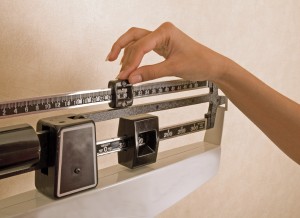Weighty Matters
 The road to losing weight is paved with good intentions. We all know the routine: counting calories, long hours at the gym, skipping meals, cleansings. People with pounds to shed will try just about anything to reclaim their bodies and their confidence. But reaching your ideal weight doesn’t have to be all about sweating it out for hours at a time or dietary self-denial, only to find yourself right back where you started. It can be as simple as making one choice. Maybe you want to be able to kick a soccer ball with your kids without being winded, or perhaps you don’t want to feel wracked with guilt when ordering at a restaurant.
The road to losing weight is paved with good intentions. We all know the routine: counting calories, long hours at the gym, skipping meals, cleansings. People with pounds to shed will try just about anything to reclaim their bodies and their confidence. But reaching your ideal weight doesn’t have to be all about sweating it out for hours at a time or dietary self-denial, only to find yourself right back where you started. It can be as simple as making one choice. Maybe you want to be able to kick a soccer ball with your kids without being winded, or perhaps you don’t want to feel wracked with guilt when ordering at a restaurant.
Coaching leads to better choices
Whatever your motivation for losing weight, Julie Dyson of St. Mary’s Health Enhancement Department believes that if you want it badly enough, wellness coaching can help you set your own goals and get you on your way.
“Wellness coaching is the key to reaching your ideal weight, and staying there forever,” says Dyson, a registered dietician, certified wellness coach and American College of Sports Medicine exercise specialist. “We all know ourselves the best and, if we dig deep, we know what we need to change. Coaching asks a lot of open-ended questions and helps people find that. People feel so empowered because they’re making the decision.”
St. Mary’s also offers a class called Nutrition Necessities. Three weekly sessions provide information regarding how to make better food choices, eat out more thoughtfully and even shop smarter using mock grocery store tours.
“It’s a lot of accountability, but what I love is the individual decides what to do,” says Dyson, who says that often nutrition class clients will schedule a coaching session to help set realistic, measurable goals. “I don’t say, ‘Eat more fruits and vegetables.’ I ask enough questions to get them to the point where they say, ‘Gosh, I need to eat more fruits and vegetables!’”
Diets don’t work
Renown’s eight-week weight management program is a little longer for those who want, or need, to lose weight. Attendees include everyone from teenagers to retirees, the morbidly obese to folks who just want to lose five to ten pounds and eat healthier. The hospital runs four sessions a year, the next starting January 11.
“I like to describe it as a wellness program for people trying to lose weight,” says Heidi Shoemaker, registered dietician and certified personal trainer. Rather than specific diet choices, the course provides tips on nutrition, stress management and exercise. “Diets don’t work so we try to teach people how to modify their lifestyle with the foods they enjoy for long-term weight loss,” says Shoemaker. “That way, they’ll be able to make better choices their whole life.”
Finding a middle ground to avoid diet rebound is important. Yo-yo dieting isn’t healthy, she says, so if it’s not a program you can stick with long-term it’s not going to help you.
Shoemaker also believes that stress, especially in hard times, affects the food choices we make, often leading to emotional eating. “Stress is one of the things that make people stop taking care of themselves,” says Shoemaker. “It’s pretty rare that you can separate that from the whole weight loss journey.”
It takes a village
Exercise is, of course, another important leg of that journey and Tahoe Forest Health System has partnered up with local physicians in a community-wide health and fitness initiative. Tahoe’s Exercise as Medicine (TEAM) seeks to educate the community about the benefits of exercise in reducing or preventing chronic diseases like diabetes, high blood pressure and cancer.
“TEAM encourages local physicians to literally prescribe exercise to patients,” says physician Nina Winans, one of TEAM’s organizers. “Physical activity should be viewed as a natural part of everyday life, like brushing your teeth.”
setting goals, keeping track
Brian Moore, owner of Anytime Fitness in Zephyr Cove, can attest to the benefits of regular exercise. The gym offers 24-hour access to its members as well as two personal training sessions to get new members motivated, setting goals and taking the right steps.
“Our first goal is to get you in a healthy range body-fatwise,” says Moore of the customized programs, adding that when body-fat levels soar beyond 30 percent huge risk factors come into play.
Moore suggests that before a new client commits to a weight-loss program, he or she keeps a food journal detailing what’s consumed (including total calories), when and why.
“If they can keep a journal for at least a week that shows that they’re committed to what they’re doing,” says Moore, who estimates that about 70 percent of those people reach their weight-loss goals.
“Weight is not lost inside the gym,” he adds. “Weight is lost the other 23 hours a day. People need to know more about how their body works and the basics outside the gym to be successful.”
Mixing it up
Another basic tenet of losing weight is that when it comes to exercise, you need variety, says physical therapist Jason Collin of South Lake Tahoe’s Barton Health. “Your body is really good at figuring out how to adjust, figuring out the least it needs to do. That’s when you need to mix it up and incorporate different modes of exercise—like cycling, running, swimming or rowing—while varying the duration and intensity. This tricks your body into losing weight and working toward that ultimate fitness goal.”
Collin is the primary fitter for Barton’s ProBikeFit program, which is geared toward optimizing power, efficiency and comfort when riding a bike. Even beginners can benefit from a professional fitting to fine-tune proper position and enjoy a longer ride.
“Walking is great exercise and it’s weight-bearing so it’s good for bone density, but if you have knee or hip problems and want to exercise more intensely, cycling is a good option,” says Collin.
Getting started
Often these programs are covered by insurance, and most don’t require a doctor’s referral. For some folks, self-referral could be the biggest step and the most crucial for success. Physical strength is nothing compared to the might of the human will.
“The most important thing is realizing the power of your choices,” says Shoemaker. “Losing weight is very, very hard because you’re never done with it. Some people have unrealistic goals with how fast it’s going to come off. I tell people, nothing changes if nothing changes. It’s a life-long thing.” By Jen Schmidt. TQ
Category: Current Issue






